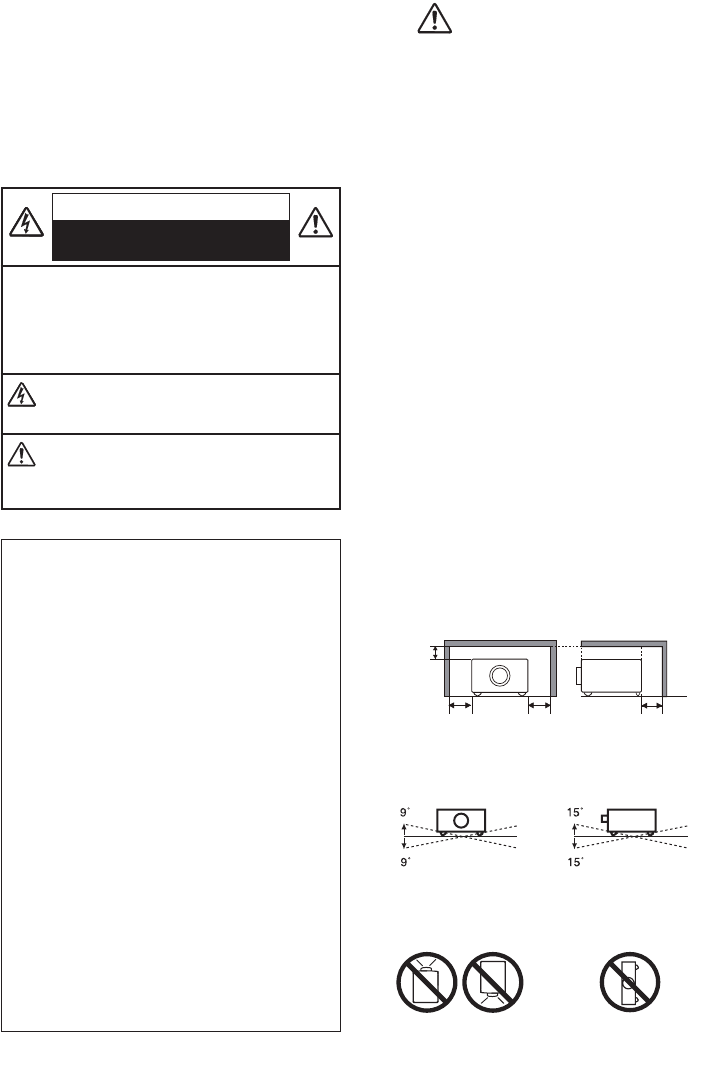
2
CAUTION: TO REDUCE THE RISK OF ELECTRIC SHOCK, DO NOT
REMOVE COVER (OR BACK). NO USER-SERVICEABLE
PARTS INSIDE EXCEPT LAMP REPLACEMENT. REFER
SERVICING TO QUALIFIED SERVICE PERSONNEL.
THIS SYMBOL INDICATES THAT DANGEROUS VOLTAGE
CONSTITUTING A RISK OF ELECTRIC SHOCK IS PRESENT
WITHIN THIS UNIT.
THIS SYMBOL INDICATES THAT THERE ARE IMPORTANT
OPERATING AND MAINTENANCE INSTRUCTIONS IN THIS
MANUAL WITH THIS UNIT.
CAUTION
RISK OF ELECTRIC SHOCK
DO NOT OPEN
– This apparatus must be earthed.
– To reduce the risk of fire or electric shock, do not
expose this apparatus to rain or moisture.
– This projector produces intense light from the
projection lens. Do not stare directly into the lens,
otherwise eye damage could result. Be especially
careful that children do not stare directly into the
beam.
– Do not set the projector in greasy, wet, or smoky
conditions such as in a kitchen to prevent a
breakdown or a disaster. If the projector comes
in contact with oil or chemicals, it may become
deteriorated.
– Install the projector in a proper position. Improper
positioning may reduce the lamp life and result in
severe accident or fire hazard.
– If the projector is unused for an extended time,
unplug the projector from the power outlet.
– Care must be taken when handling the projector; do
not drop, bump, subject it to strong forces, or put
other things on the cabinet.
– Do not cover the ventilation slots on the projector.
Heat build-up can reduce the service life of your
projector, and can also be dangerous.
– Allowing the proper amount of space on the top,
sides, and rear of the projector cabinet is critical
for proper air circulation and cooling of the unit.
The diagrams shown here indicates the minimum
space required. If the projector is to be built into a
compartment or similarly enclosed, these minimum
distances must be maintained.
1.5' (50 cm)
1.5' (50 cm) 1.5' (50 cm)
3' (1 m)
SIDE and TOP
REAR
Safety Precaution
Before installing and operating the projector, read this
manual thoroughly.
This projector provides many convenient features and
functions. Operating the projector properly enables
you to manage those features and maintains it in better
condition for many years to come.
Improper operation may result in not only shortening the
product life, but also malfunctions, fire hazard, or other
accidents.
– Avoid positioning the projector as described below
when installing.
Do not roll the projector
more than 9 degrees from
side to side.
Do not put the projector
on either side to project an
image.
Do not pitch the projector
more than 15 degrees from
above and below.
Do not point the projector
up/down to project an
image.
Federal Communications Commission Notice
This equipment has been tested and found to
comply with the limits for a Class B digital device,
pursuant to Part 15 of the FCC Rules. These limits are
designed to provide reasonable protection against
harmful interference in a residential installation.
This equipment generates, uses, and can radiate
radio frequency energy. If it is not installed and used
in accordance with the instructions, it may cause
harmful interference to radio communications.
However, there is no guarantee that interference will
not occur in a particular installation. If this equipment
does cause harmful interference to radio or television
reception, which can be determined by turning the
equipment off and on, the user is encouraged to try
to correct the interference by one or more of the
following measures:
– Reorient or relocate the receiving antenna.
– Increase the separation between the equipment
and receiver.
– Connect the equipment into an outlet on a
circuit different from that to which the receiver is
connected.
– Consult the dealer or an experienced radio/TV
technician for help.


















